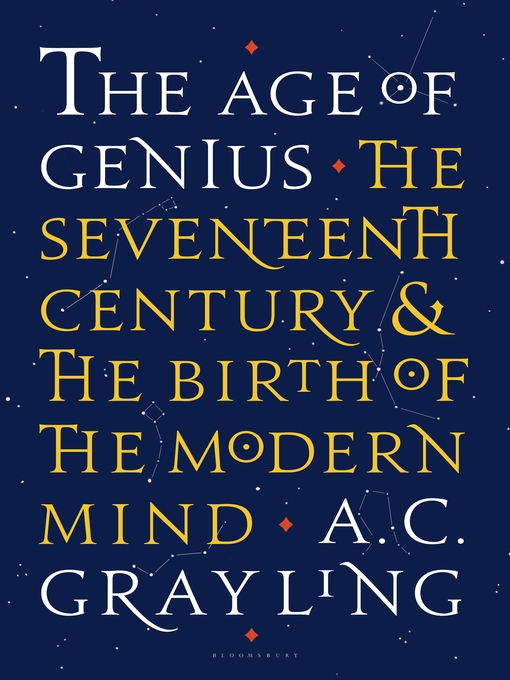- Popular Magazines
- Just Added
- Cooking & Food
- Fashion
- Health & Fitness
- Home & Garden
- News & Politics
- See all magazines collections
Grayling vividly reconstructs this unprecedented era and breathes new life into the major figures of the seventeenth century intelligentsia who span literature, music, science, art, and philosophy—Shakespeare, Monteverdi, Galileo, Rembrandt, Locke, Newton, Descartes, Vermeer, Hobbes, Milton, and Cervantes, among many more. During this century, a fundamentally new way of perceiving the world emerged as reason rose to prominence over tradition, and the rights of the individual took center stage in philosophy and politics, a paradigmatic shift that would define Western thought for centuries to come.
-
Creators
-
Publisher
-
Release date
March 1, 2016 -
Formats
-
Kindle Book
-
OverDrive Read
- ISBN: 9781620403457
- File size: 3150 KB
-
EPUB ebook
- ISBN: 9781620403457
- File size: 2999 KB
-
-
Languages
- English
-
Reviews
-
Library Journal
February 1, 2016
Grayling (philosophy & master of the college, New Coll. of the Humanities, UK) explores the making of the modern mind in the 17th century, claiming that the period is unique because of how quickly European thought moved from a medieval mind-set to a modern one. The religious conflicts and wars of this era led to what Grayling calls "the distracted authorities," where those in charge were focused on conflicts instead of policing intellectual thought. The flourishing of ideas during this time was also influenced by the demise of occult thinking, the ease of correspondence, and the use of new scientific instruments. Rather than relying on religion and faith, the philosophers and scientists of this time, such as Rene Descartes, Thomas Hobbes, and Francis Bacon, were able to reject freely the influences of past thinkers and use reason and observation as a basis for their theories. VERDICT Grayling does a fantastic job of proving his assertion that the 17th century saw a dramatic shift in Western thought. Readers with an interest in the history of philosophy and scientific discovery will enjoy this highly engaging book.--Scott Duimstra, Capital Area Dist. Lib., Lansing, MI
Copyright 2016 Library Journal, LLC Used with permission.
-
Publisher's Weekly
January 11, 2016
In this insightful history, Grayling (The Challenge of Things), a professor of philosophy and master at the New College of the Humanities in London, claims that the 17th century “is in fact the epoch in the history of the human mind.” He theorizes that this period marked a momentous transition in the way people think and approach the world, that “the mindset of the best-informed people in that century changed from being medieval to being modern in so short and tumultuous a time.” Recognizing the vastness of his area of focus and the impossibility of covering it all in one volume, Grayling nevertheless makes a spirited effort to address as much as possible. He ties together the wars that disrupted the status quo and transformed the geopolitical landscape, the onset of the scientific revolution that supplanted superstition, and the general flow of ideas and inspiration, showing how numerous figures in dozens of disciplines contributed to a cultural evolution. The 17th century in Europe, he concludes, “redirected the course of human history by changing humankind’s perspective on the universe and itself.” Grayling’s style is densely academic, but his book is nonetheless informative and thoughtful. Agency: Felicity Bryan Literary Agency.
-
Formats
- Kindle Book
- OverDrive Read
- EPUB ebook
subjects
Languages
- English
Loading
Why is availability limited?
×Availability can change throughout the month based on the library's budget. You can still place a hold on the title, and your hold will be automatically filled as soon as the title is available again.
The Kindle Book format for this title is not supported on:
×Read-along ebook
×The OverDrive Read format of this ebook has professional narration that plays while you read in your browser. Learn more here.


